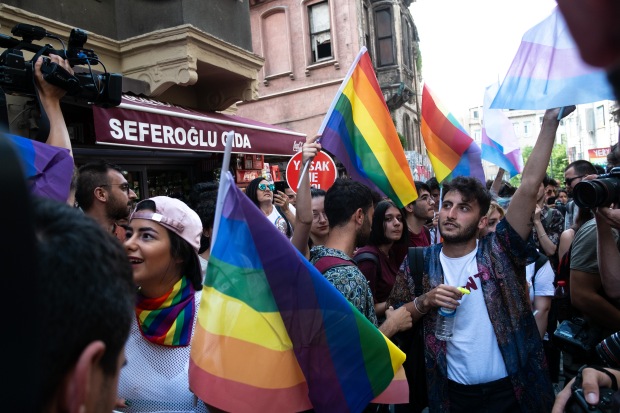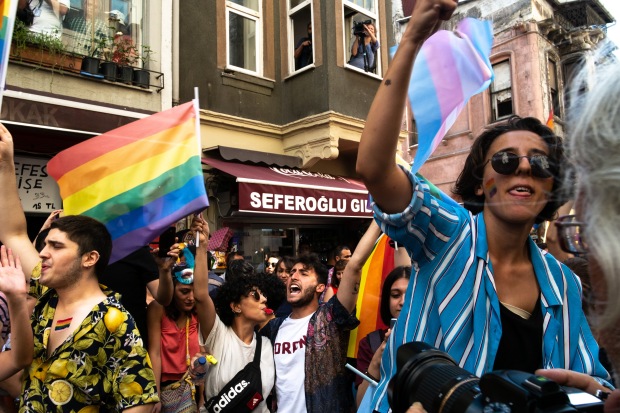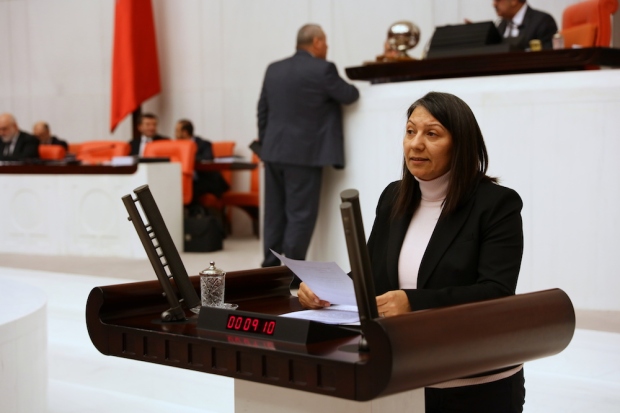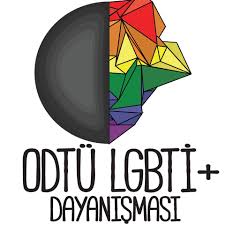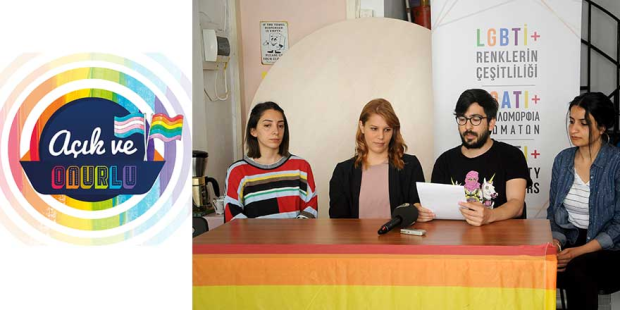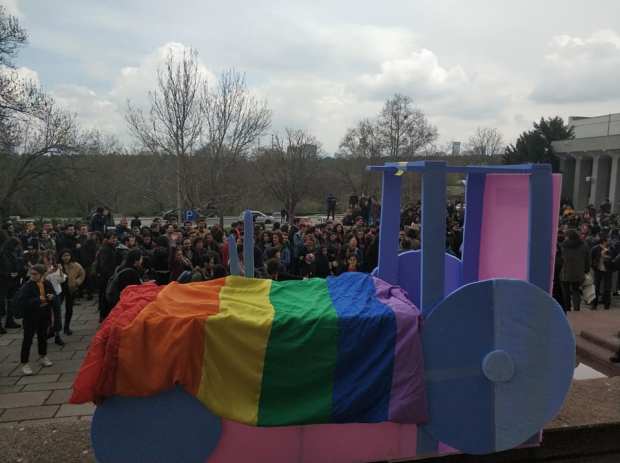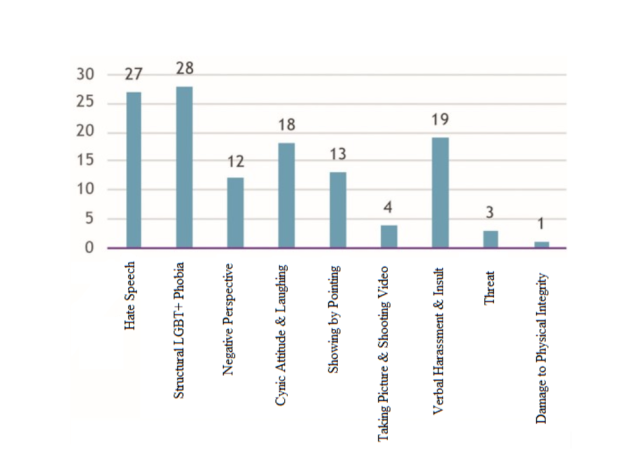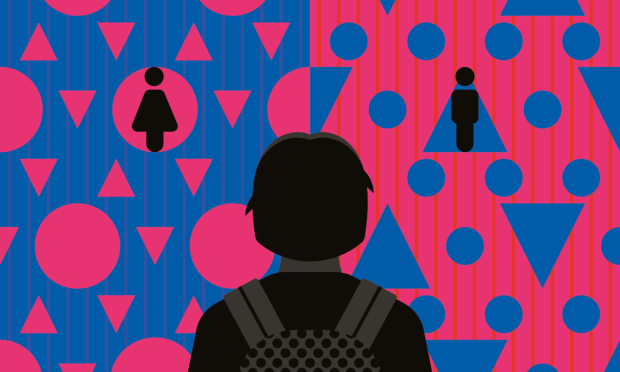Source: Trans student, Şafak Koç, who was expelled from the dormitory: “The number of those who undergo gender affirmation surgery and get murdered is the same as the number of those who don’t undergo surgery and commit suicide.” (Yurttan atılan trans erkek öğrenci Şafak Koç: “Türkiye’de cinsiyet geçişi yapanlarla, yapmayıp intihar edenlerin ve öldürülenlerin oranı eşit”) F. Çiçek Yaman & Rojhat Tunç, Gazete Hayır, April 3, 2019, http://gazetehayir.com/roportaj-yurttan-atilan-trans-erkek-ogrenci-safak-koc-turkiyede-cinsiyet-gecisi-yapanlarla-yapmayip-intihar-edenlerin-ve-oldurulenlerin-orani-esit/
On Wednesday, March 27, we made an interview with Şafak Koç who is a student at the Department of Media and Communication at Üsküdar University. Şafak was expelled from Ataşehir KYK* Dormitory for Girls where he had been staying before coming out as a trans man. We met with Şafak after this event to reveal the problems that LGBTI+ individuals have in their social life. Şafak began his story by describing his life starting in Van and then moving to İstanbul. The interview is below.
First of all, can you tell us about realizing your gender identity?
A child discovers his/her gender identity around at the age of 3. I thought I was a boy, but I realized my body was female when I saw the penis of my male cousin at the age of 5. I didn’t talk at all until the age of 9 because of the discourses that “girls don’t do that” and “girls don’t play with boys.” I was not able to talk with people and express myself. I didn’t even know how to walk actually. People used to tell me that “you don’t even know how to walk.” I researched about gender identity for 3 years, because everyone around me was either female or male profile and I didn’t fit among them.
I couldn’t act like a woman or reveal the man inside me because I was ashamed. When a person told me that “you walk like a man” I got so sad. I wondered: “is there something wrong with me?” Moreover, I had nobody to help me and I was always confused. I hadn’t shared this confusion with anybody until the age of 18. I searched for things like “the mind is male and the body is female; what does this mean?” I thought a person who is not like this would not search for this kind of information. Then, when I was 18 years old, I learned that I was a transsexual person. I became so happy because I realized I was not alone and there were people just like me. On the other hand, I was scared of what my family would say. Because the number of those who undergo gender affirmation surgery and get murdered is the same as the number of those who don’t undergo the surgery and commit suicide.
Did you have problems during your high school? High school years can be problematic.
Yes, of course I did. Girls had to wear skirts at our school. Wearing trousers was forbidden. I would wear it compulsorily and I couldn’t go outside of class by any means. My hair was always in an updo and I couldn’t get my hair cut. Also, girls who had their hair cut were considered awkward in Van. Then, people started to ask me “why don’t you go out with boys?” They even thought that I was a lesbian. So, many friends of mine ended their friendship with me without even talking to me just because of this thought. Everyone around me thought I was a lesbian, because I wouldn’t go out with boys and would act like a man. But, believe me, acting like a man was not something I could avoid–I felt that way deep inside. What could I do? I started to wear trousers in 11th grade and I was given reprimand. I had reactions from my family because of it too.
How did it go after you realized your gender identity?
When I went to a psychologist for the first time in 2016, I asked: “I really wonder how many people are there like me coming here?”. The psychologist answered me that [there are] “two other people.” They were children of teachers and they came here from other cities. That means I was the only person who was born and raised in Van who had the encourage to be their self. This frightened me a lot. I left Van by changing my choices. I wanted to come to İstanbul and study media and communication because I though I would be somewhat free if I came to İstanbul and studied here. But then, I thought and told myself “what about other people?” It makes no sense. However, my family didn’t want me to study media and communication so I enrolled in the school by myself. Besides that, I was arrived just one day before the end of the enrolment period and it was difficult. I thought I became free when I came here. Everyone had come down hard on me and were both physically and psychologically abusive. I was already so confused because I was 18 and their reactions made everything more difficult.
So, you were the first person who saw a psychologist in Van about it?
Yes. But that doesn’t mean that there are no transsexual people there. We are not visible. For example, the suicide rates in Van is really high and people don’t know the suicide reasons for the majority of deaths.
How did your gender transition process start?
When I began studying at university, I planned to start the process after I graduate and become economically independent. But I broke down psychologically this year; it is really difficult to bear. So I went to a psychologist and learned that I had to start my gender transition for my mental health and medical treatment was started.
Have you ever had a chance to talk to your family about it, do they know?
I have. They know. But they reacted really bad. I don’t blame them completely, because this is something that they have never seen before and they are shocked about it. Just think about it: the person who you think is a girl for 18 years is actually a boy. They didn’t accept it. They insulted and beat me, just because I am a transsexual individual. Why do these things happen? It is really strange. Moreover, some people think that this is something arbitrary. Who wants to live a life like that? I think people should really understand. My family cut their financial support for me when I came to İstanbul. When they did so, I moved to a KYK dormitory because I had no place to stay. I have many relatives here, but I didn’t want to go to them. I have a sister one year older than me. She lives in İstanbul. But I couldn’t call her either when I was expelled from the dormitory. She already said to me that she wouldn’t help me if something happened. She told me to be still and live my life as a woman even if I am a transsexual person. I thought everything ended when I came to İstanbul, but I felt uneasy about going outside during the first couple of months, thinking they might be around. I couldn’t talk to anyone again. If a person is scared of his/her family, yes, there will be a little fear. The fear is less than the previous year, though. Now I think that everything that will happen can happen because I’ve given up on myself. For some reason, my fighter side came to exist. I came from there, but I still fret about what those people are doing. Some of them send me text messages. It hurts a lot. They are forced to get married and I think about being forced to get married to some guy, I would probably commit suicide. Every 6 in a thousand people are born transsexual. This is not a low rate.
Can you tell us about the period after you moved to the KYK dormitory?
When I first entered the room, I told my roommates that “I am a transsexual person”. “Keep it in mind when you dress up or undress if you feel uncomfortable about it.” There was no problem. We were 8 people in the room and one of them wouldn’t come to the room. 6 of them were supporting me. This year was the same. We slept together and were really close. I am currently staying at the house of my friend who I met at the dormitory last year. I had no problem with the students at the dormitory. Just one time, the female president of the dormitory told me “your hair is so short, you look like a man. Grow it long!” I got so angry at her and that’s why I had my hairs cut shorter the next day. And then, she laughed at it. I and the president would joke with each other. But she would often interfere with the students staying at the dormitory and ask questions like “why do you wear such revealing clothes?”. For example, a female student was expelled from the dormitory just because she hugged her boyfriend in front of the dormitory door. When the meals were terrible and students protested demanding better quality food, all the protesters were punished. Actually, almost all KYK dormitories are the same.
What was the process which led to your expulsion from the dormitory?
This year, I have been fairly visible on Twitter. A news article about me was published and I started to become known. Almost everyone at the dormitory learned that I am a trans person. The majority supported me while only a couple of people reacted badly. I was a little scared because if a complaint about it was made to the dormitory I would directly be sent to the disciplinary board, it would be written in my records, and my scholarship would be cut. So I decided to share the situation with the dormitory administration. I had consulted with the psychologist of the dormitory a couple of months before. I had told I was a transsexual man. I had shared my concerns and worries. The psychologist had told me “don’t share it with anyone at the administration, they will immediately send you away.” But I shared it with the administration last week. I told them “If a complaint is made, you can get trouble and a woman can get uncomfortable. If she makes a complaint to somewhere else, it gets worse for me; therefore, I am sharing it with you now.” At first, they seemed to be reacting well, but I was expelled from the dormitory the next day.
Let me tell you about these two days. On the first day, the day when I came out being a trans man to the president of the dormitory, they told me that they understood me and wouldn’t see me as a deviant. They even said that saying to someone, “you are not a deviant” is a transphobic statement. Because you cannot say it to any person when it is not true. Therefore, you cannot say it to me, as well. Then, the psychologist of the dormitory said that “We will ask you to leave tomorrow, you should stay at the house of a friend of yours temporarily”. After news started to spread, a lawyer contacted me and told me that they were trying to intimidate me and they were treating this way so that I wouldn’t cause a problem. The lawyer explained to me that the administration may had heard about it through Twitter or a newspaper article; they would try to shut the event down and thought that I may do something or that they may get affected by it. The lawyer told me to contact them if a problem occurs tomorrow, and that they could come to the dormitory right away.
The next day, I told the president that I didn’t have a place to stay and I was not dependent on anyone because the state granted me the right to stay at this dormitory. I asked for a month of time. She tried to look like she was treating me well again and told me “We need to think for ourselves. You leave the dormitory tomorrow and stay at a friend’s house, won’t you?”. Then, she gave me a paper and asked me to sign it. Afterwards, I acted as if I believed her; I told her that I wanted to go outside to call a friend in order to learn if the house was available. I called my lawyer.
After the lawyer came, the president heard about it and went mad. She locked me inside a room and didn’t allow the lawyer to come inside. She started to shout, pressed the alarm button, called someone, and asked them to come to the room immediately. 6 women came to the room; one of them was the psychologist of the dormitory and another one was an officer working at the district directorate. We started to quarrel. All of them started to shout at me. When I told them that I had the right to defend myself, they told me that they would initiate legal actions. When I answered that “Okay, you are talking about legal actions, but I am an ordinary citizen. So, I want you to negotiate it with my lawyer.”, they didn’t accept it once again and told me that they would have nothing to do with a lawyer. They asked me to direct this to a higher board. The president of the dormitory had always been like this. She didn’t even get a signature from a women she previously expelled from the dormitory. She had made up something and expelled them, but she tried to make me sign a paper because there was no reason to expel me. In the meantime, they kept telling me that they would take disciplinary action but I didn’t believe them at that time. “This is ridiculous,” I laughed at them.
During the quarrel, they often talked about my gender identity. I felt really offended. You get really offended when a person insults you just because you are a woman; it is the same, or double time worse. They acted like I was a guest of theirs and a burden to them. One of them said that “if even your family doesn’t care about you, why should we do?”. It hurt a lot. Then, I reminded them about my right to stay at the dormitory. I told them that I couldn’t stay at the dormitory for boys because my identity card is pink. Because my identity card hasn’t changed; even if I take hormones and become a man and my beards start growing, I am seen as a woman in this country as long as my identity card doesn’t change. So, they cannot expel me from the dormitory just because I underwent breast surgery. One of them told me that “you say your identity card is pink and claim you are a man. You contradict yourself. If you are a man, just leave!” When I repeated that I didn’t have a place to stay, they told me that “did you consult with us about it?”, as if it is something arbitrary. I asked them directly, “So, I am being expelled right now, just because I am a transsexual person, am I right?”. Nobody could say anything for a while. Then, one of them told me that I was being expelled not because I was a transsexual person, but because I was disrupting the moral order. When I told them that what I was doing was not immorality, they said to me that “It is not immorality, but you are disrupting the order. Why did you reveal yourself? Why are you sharing it on Twitter? Okay, you are a transsexual person, but you should have kept it to yourself, why do you share it with people?” When I told them that the situation which I am in now is the result of the society pushing us to be invisible, they said to me that I am facing all these because I made myself visible. I understand it, they don’t know that transsexuality has a place in society; however, gender transition is one of our rights stated in law. Nethertheless, their attitude was like this.
When I told them that I didn’t think they had helped me, they got angrier and said to me that I had 3 hours to leave the dormitory. They threatened me by saying that I would be punished more and something bad would happen to me if I tried to resist.
You said that the psychologist of the dormitory was there during all the quarrel. How did she react?
When I told the president that the psychologist already knew that I was a trans man, the psychologist denied it. However, she had asked me not to tell the president about it, otherwise, she would get into trouble too. All these people in that room were afraid of each other. Think about it, even the psychologist couldn’t remain unbiased.
There are 788 students at the dormitory. Are there other LGBTI+ individuals you know there?
Yes, there are. I am sure about it. There are 4 LGBTI+ individuals that I met at the dormitory, but none of them are visible, because people are really cautious. I have a pansexual friend at the dormitory. They always protested the situation saying “Why can’t I walk by holding hand with the person I love? Why can’t I talk about it to someone? Why are people always biased about me?”
So, did the students react against the administration?
They started to a petition to show they were standing by me. They thought they could use it as proof when a lawsuit was opened. Something like “Şafak was expelled for no reason because nobody was disturbed by Şafak.” There were so many signatures at the petition, however, they stopped because they were afraid of someone notifying the president. Then, we consulted the lawyer and they said that it would not cause a problem. They continued to collect signatures for the petition afterwards. In addition, I received so many text messages from the dormitory. The people I don’t know sent me messages saying “We were not disturbed by you, how come they expelled you, you were an honest and composed person”.
How did the students at the university react before and after the event?
I have had no problem at the university. There are already visible LGBTI+ people there, like me. The rector, the dean, and my friends know that I am a transsexual man. Some of the students have negative attitudes; despite that, I have never experienced something like that before. I am introverted because my voice is high pitched, and I sometimes don’t want to go to school.
After the event, how did the school administration react? Did they support you?
I don’t know if they know about it or met with anyone. I have no idea.
You are seeking a job in the meantime. What difficulties do you face in business life?
Generally, “It is okay for us, but the customers may feel uncomfortable,” they say. Trans women are in a more difficult situation than I am because people don’t notice trans men after the gender transition. Even before that, it is hard to notice if his voice is not high pitched. After starting to take hormones, you become like a biological male when your beards start growing. But trans women are more easily noticed. They cannot find a job under any circumstance and are forced to work as a sex worker. At first the system constrains them and forces them to do so; then people criticise them by saying “why do they work as a sex worker?”. But it is the system that forces them to do so, and I cannot understand this.
You are staying at a house of one of your friends and have recently been looking for a job. Are there any LGBTI+ individual who you know went through the same process?
I have two transsexual friends. Both of them were expelled from the dormitory. Let me share the story of the expulsion of one of them. This boy goes to his home town and meets his lover there. The lover’s brothers and father beat the boy for an hour and a half, harassing him. They threaten to rape him. The event takes places in the newspapers and the boy gets expelled from the dormitory. He was forced to leave the school; then he was expelled from the school too. I reached out to him and asked that “Why did you give up?”, but he said to me that “What else could I do?” Just think about it, I will stay quiet, not go to school, and leave the school, etc. I would never do something like that. This year, another friend of mine was expelled, too, moved to a private dormitory, and they told me the same thing. They make us ashamed of ourselves. I got so sad about all this and I had already known that it would happen to me too. I was expecting it. For a month, I told my friends that I would never stay still if I were expelled. Because, if I were the only one living all these problems, I would just go away and not care about them at all; however, -believe me- some people are not accepted to dormitories in the middle of Anatolia, just because of having a short hair. Just because they have short hair. So, I want to set off a reaction at least. In the end, I am not doing all these so I can go back to the dormitory. We need to set off a reaction to prevent anything like this. They don’t accept us to the dormitories for boys, we cannot stay there. We are expelled from the dormitories for girls. Then, they should build a dormitory for trans individuals or stop discriminating against us. If I felt guilt, did something to a woman, or stole something, they could expel me right away. But there is nothing wrong with me. Just think, you get expelled from the dormitory, because you are a woman, Çiçek. Or you, Rojhat, get expelled from dormitory because you are a man. I think this is ridiculous.
Is there something you want or plan to do for LGBTI+ individuals?
For example, I will be on the videos of the program called “Soramazsın” (You cannot dare to ask) as a transsexual man. It will be broadcasted in the third week of April. But it is not something that I do to become a celebrity. When we look at the media, trans women are known and visible, whether or not they want to be; because people cannot help but notice them from their voices. But trans men are like “I became a biological man and will continue my life like this from now on.” As it is for Rüzgar Erkoçlar. He said that “I don’t want to be mentioned as an LGBTI+ individual”. Because society really tries to make us ashamed. So, people are not trying to be visible, they try to save themselves. But I have realized that I am not the only one I need to save, after the things I saw in the east of Turkey and the people in the east who reached out to me. So, I attended the video program called Soramazsın, despite the fact that my family can see it. Other than that, there is a documentary which is planned to be broadcasted internationally. It includes my gender transition process and the event of getting expelled from the dormitory; it will be filmed for 2 years. Actually, I attend to do various projects in several places. There is also a book project and a journal at Sabancı University.
Şafak’s life, starting in Van and moving to İstanbul looks like it has two different stories from city to city but it shows us a scene where, between the cities, only the methods of pressure are changed . Şafak has highlighted many times that transphobia, homophobia, and biphobia are reproduced in social life through many ways (series, movies, education, workplaces, etc.) and one of the ways to prevent it is to be visible. He has stated that the main reason for his will to prevent it is because this problem is not only his personal problem; it is a mutual problem shared by many people recently. Lastly, despite all the physical and psychological violence, Şafak clearly declares that he will not give up fighting; he invites people sharing these problems to be “visible together” and to fight together.
Translator’s note, KYK: Higher Education Student Loans and Dormitories Institution of Turkey
Share this:
-
Click to print (Opens in new window)
-
Click to email this to a friend (Opens in new window)
-
Click to share on Facebook (Opens in new window)
-
Click to share on Pinterest (Opens in new window)
-
Click to share on Tumblr (Opens in new window)
-
Click to share on Reddit (Opens in new window)
-
Click to share on Pocket (Opens in new window)
-
Like this:
Like Loading...
